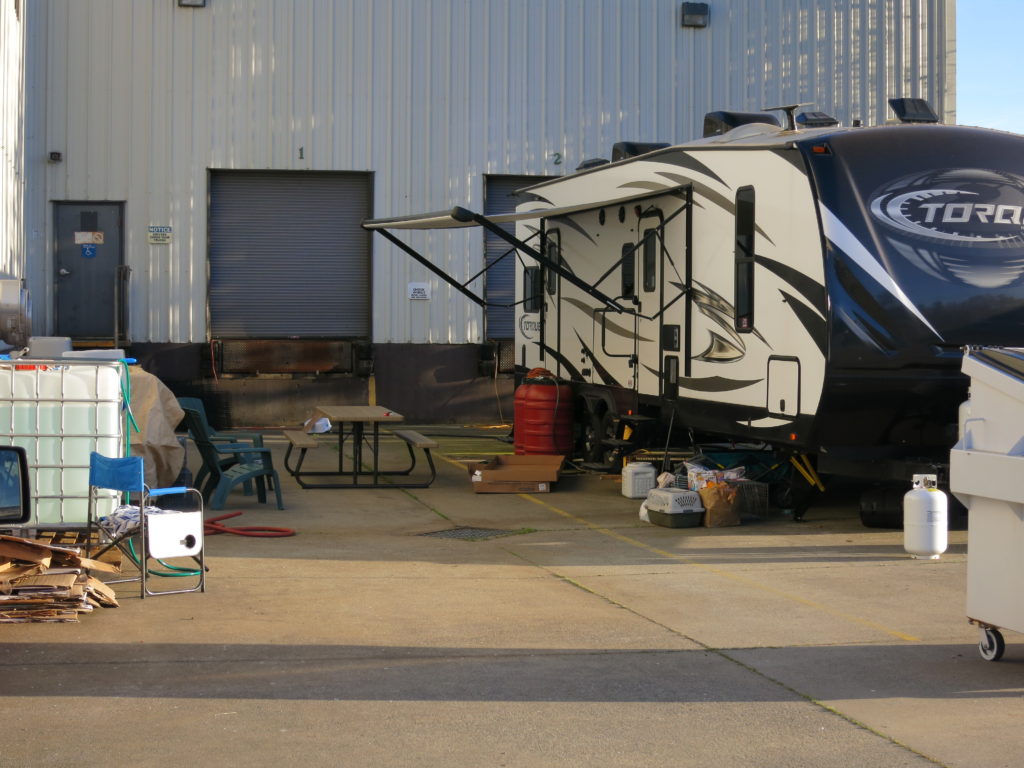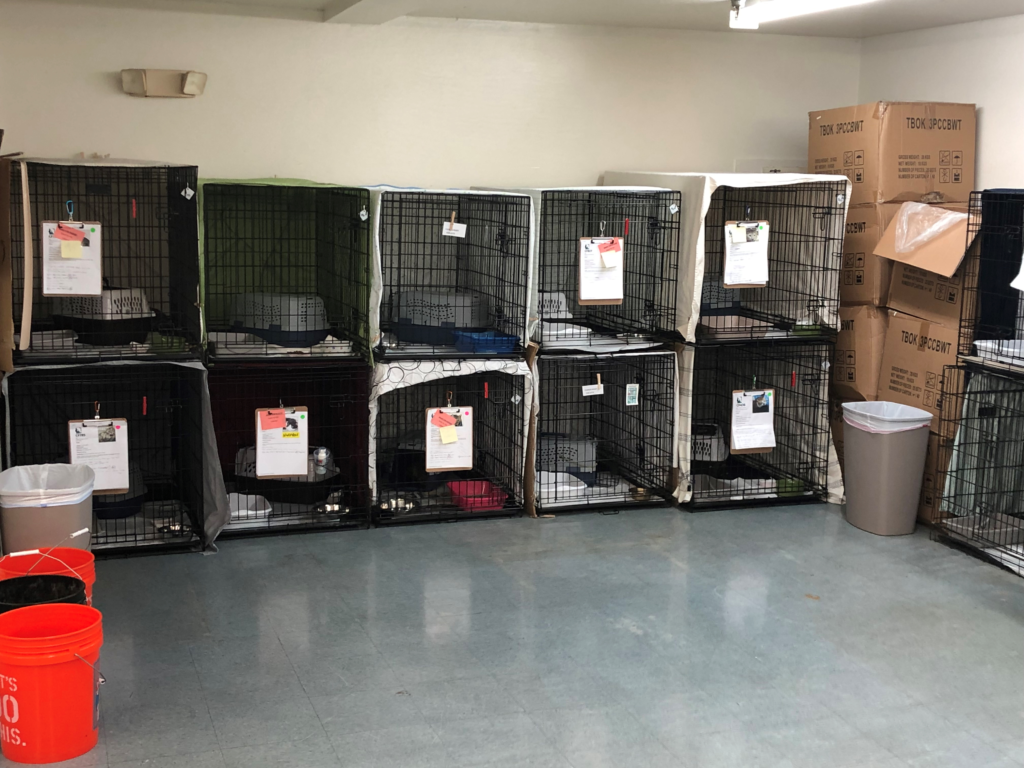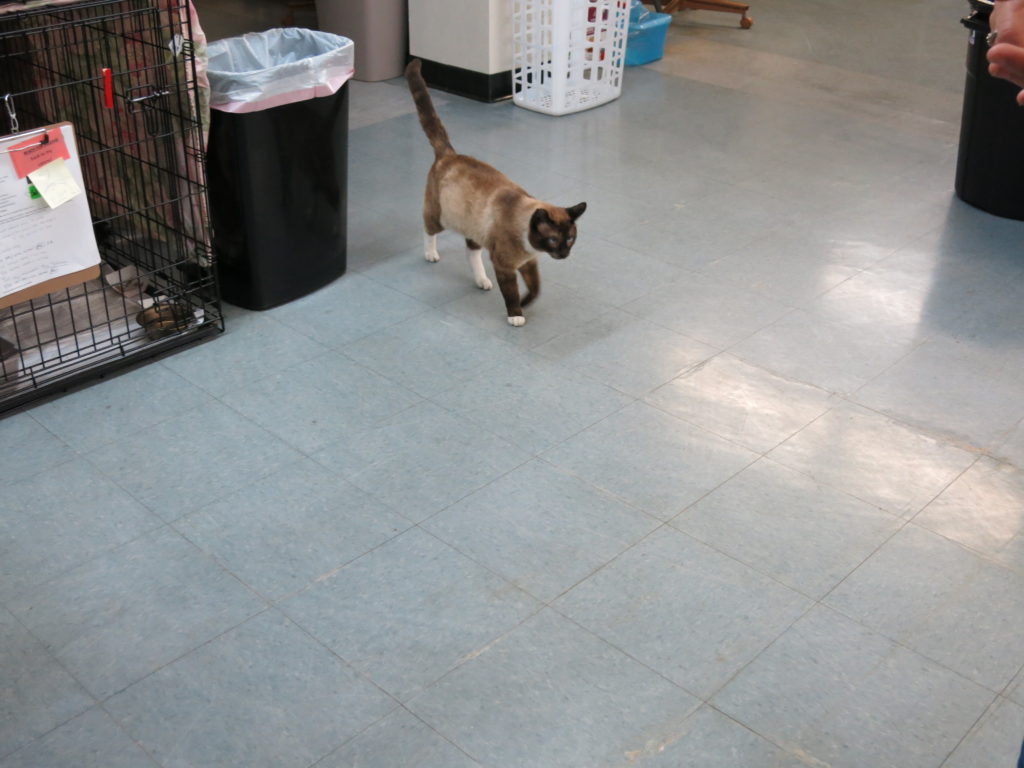Outside a warehouse bereft of an operating thermostat, cold in appearance with its barren cemented walls, with pipes and lights being the only objects that could make one’s eyes jump, there is a camper parked on gravel that has acted as a makeshift home for two women.
Joy Smith, who is the executive director at FieldHaven Feline Center, and Jennifer Petrushka, who oversees Pet Rescue and Reunification, overtook the establishment with a single-minded passion of cats, knowing themselves how much domestic felines can captain, positively, one’s psyche.
Lucidity was no more for many pet owners after Nov. 8, as their house cats were now on the prowl and renamed “fire cats,” masquerading behind weathered fur coats, which may have been singed, and enraged locomotion.

At a discounted rate, compared to the opening weeks following the fire, cats are coming in being micro-chipped, vaccinated and spayed or neutered, nearly six months after the disaster.
Hundreds of pets were on the lam following the Camp Fire, which displaced 35,000 people.
The outset of this pet restoration typically begins with an owner reporting a missing cat. Once there is reason to believe that a cat, or a group of cats, has gone astray, Jen and company put feeding stations out in the wilderness, with game cameras overhead, so that the feline will be more susceptible to entrapment — this is all, in their hopes, en route to the facility. Trappers, who are strict volunteers, are then deployed to hover over the feeding stations and decide whether to hand-trap or drop-trap.

Though the procedure seems guerrilla, what the two women, and their respective organizations, have done since the Camp Fire is metaphorically ink a thick tale of derring-do.
“The cat comes in, and the first thing we do is scan for a microchip,” said Smith, who then takes many pictures, all to potentially suss out distinct features, such as white on the belly or markings on the whiskers. “Of course, when you have a plain black cat, it makes it really challenging, but there are things, like Jen taught me: we run our hand down the tail — and if you feel a bump, ok, that’s a distinguishing feature.”
All this subtlety is then posted only on Facebook, where the deduction of one-time owners, whom may have already submitted pictures to Smith or Petrushka’s organization, takes full rein.
There are a lot of false alarms involved in this kitten espionage, however.
“Chances are that black and white cat — we might be looking for ‘Prancer,’ but we’re probably going to get 20 or 30 of them,” said Smith, who only had experience in the “trap, neuter, return” philosophy, upon meeting Petrushka.

A proactive way to nearly ensure reestablishing relations would involve the microchipping of the animal. Because that hasn’t been the case, an abundance of cats has arisen, so much so that there are two other cat shelters in the area: Fur, which has 20 to 30 cats, and Fire Cat Farm, which sprang up in response to the Camp Fire and holds a large social media following.
“But it was so big, that it was beyond anybody’s scope…ever — this was beyond Katrina,” said Smith, who knew people from Alley Cat Allies who worked during the deadly hurricane. “There was just a lot of confusion.”
Petrushka began handling fire cats after the Tubbs Fire, which occurred four hours southwest of Paradise in 2017 and had half the impact of the Camp Fire. Now, caged kittens have built a decent rapport with her.
Reestablishments between cats and humans — and subsequent tears dropping by the gallon — have occurred because of a noticeable kink in the tail. Conversely, once-upright spines have slouched once the two women turn an owner, whose description doesn’t line-up, away.
Sometimes, it’s hard to tell, for the person…and the cat.
Cat post-traumatic-stress disorder exists and, according to Smith, can manifest in self-inflicted starvation and severe isolation. With toys at their disposal at the facility and usual collective choruses of mews ringing out at night, PTSD cats can usually be identified by their lack of participation by Smith and Petrushka. Enlarged hearts due to smoke inhalation can also alter a cat’s presentation.
If a cat is too far gone, as determined by one of the few veterinarians, they can be placed in rehabilitation centers.
Smith lives near the facility, so, it’s not uncommon for her to go home once a week. Petrushka, meanwhile, hasn’t been home for two months. In both cases, their families understand.
“They aren’t just like humans, but there are always going to be triggers,” said Petrushka, using an example of an active fireplace serving as something that could exhume the stresses from the Camp Fire.
On the morning of Nov. 8, Smith was giving a presentation on behalf of FieldHaven in Butte County, one in which she mentioned the sheltering of animals of evacuees. By midnight, she was living her previously spoken words, setting up shelters.
“People would go to the Red Cross Shelter,” said Smith, “and their animals would come to us.”
A thick, orangish fog of flames stood dormant for many hours. Meanwhile, Smith was being told that she would be receiving 600 cats and a bigger building, only to receive far less of what was presented.
Though Smith and Petrushka didn’t pursue dogs after the fire, canines are typically seen as less survivalist than cats, who are more independent and cunning. The period for recovering dogs ended far before cats, because most dogs either went with their owners or perished, or walked willingly up to strangers to be rescued.
A poor game of telephone — or simple bureaucratic strife, according to Smith, who was somewhat sympathetic toward city officials — was played between the Butte County Office of Emergency Services: the Incident Command Center and the Operation Center, in Oroville, Butte County Animal Control and the North Valley Animal Disaster Group, who helmed the animal response unit.
Bags of cat food have been donated via drives, while toys have been made out of Dollar Store trinkets, with many coming via online donation, too. The women estimate that over 800 cats have been rescued by FieldHaven Feline Center and Pet Rescue and Reunification alone, even though the two teamed-up just in early February.
With this temporary hump being over, and fewer people visiting, Smith and Petrushka, with the support of FieldHaven Feline Center and Alley Cat Allies, are not resting on their laurels, as not every citizen has gotten back their cat(s). But, they believe, like many others in Paradise, people in the community can rebound as fervently as ever.